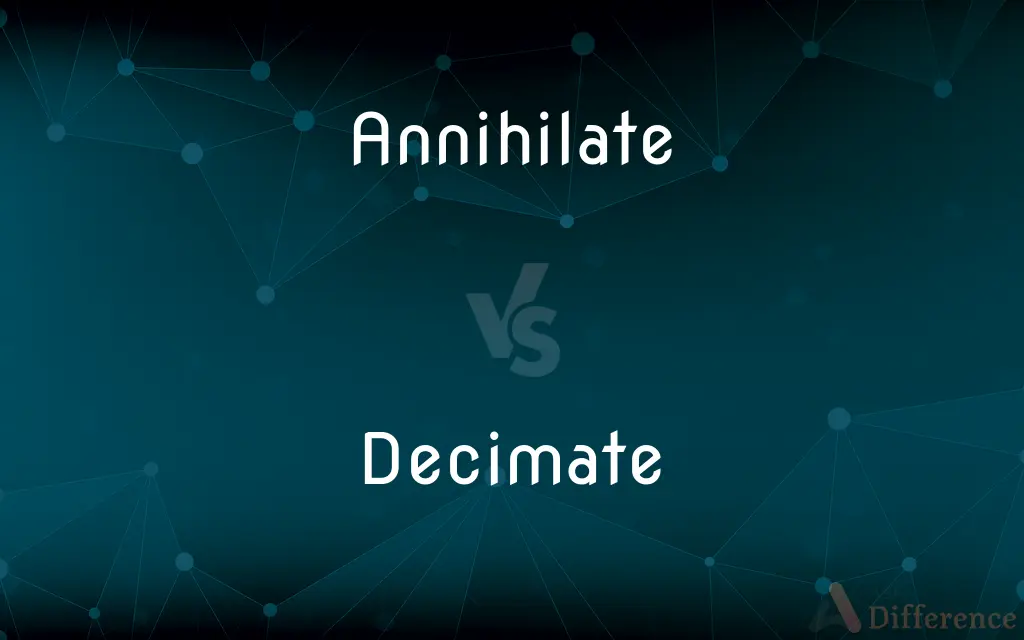Annihilate vs. Decimate — What's the Difference?
By Fiza Rafique & Maham Liaqat — Updated on March 9, 2024
Annihilate means to completely destroy or obliterate, while decimate refers to killing or removing a large portion of something, often one-tenth, originally in a historical context.

Difference Between Annihilate and Decimate
Table of Contents
ADVERTISEMENT
Key Differences
Annihilate is used to describe total destruction or complete obliteration of something, leaving nothing behind. It implies an absolute end with no survivors or remnants. On the other hand, decimate originally referred to the Roman practice of killing one in every ten soldiers in a mutinous group as punishment, but it has evolved to mean the destruction or removal of a large part of something, not necessarily one-tenth.
The term annihilate is often used in contexts where there is a complete eradication of entities, such as in warfare, where an army might be entirely wiped out, or in science, where particles are completely destroyed. Decimate, while it can be used in similar contexts, usually denotes a significant reduction rather than total destruction, suggesting that while a large portion is affected, some part remains.
Annihilate implies a level of intensity and totality that decimate does not. When something is annihilated, it is utterly destroyed to the point of non-existence. Whereas decimate implies a heavy toll or severe impact, but not to the extent of complete eradication.
In historical contexts, annihilate has been used to describe scenarios of extreme destruction, such as cities being razed to the ground with no buildings left standing. Decimate, in its historical usage, was more precise, indicating a methodical and proportionate approach to punishment or reduction, although this precision is less often observed in modern usage.
While annihilate is often associated with physical destruction, it can also be used metaphorically to describe situations where concepts, ideas, or entities are completely discredited or rendered moot. Decimate, meanwhile, is more commonly used to describe significant losses or reductions, whether in populations, resources, or other measurable quantities, without implying total loss.
ADVERTISEMENT
Comparison Chart
Meaning
Complete destruction or obliteration
Killing or removing a large portion, historically one-tenth
Context
Often used in extreme scenarios of total destruction
Originally military punishment, now means significant reduction
Intensity
Implies total eradication, leaving nothing behind
Suggests severe impact but not complete destruction
Historical Usage
Used to describe scenarios of extreme destruction
Specific to Roman military punishment, evolved over time
Modern Usage
Total destruction, can be physical or metaphorical
Significant reduction or loss, not necessarily one-tenth
Compare with Definitions
Annihilate
To completely destroy or obliterate something.
The asteroid impact annihilated the dinosaurs.
Decimate
To kill or remove a large portion of something.
The plague decimated the population.
Annihilate
It conveys total eradication with no survivors.
The invading army sought to annihilate the opposition.
Decimate
Originally referred to killing one in ten as punishment.
The mutinous soldiers were decimated as a warning.
Annihilate
Annihilate is used in contexts of extreme destruction.
The fire annihilated the ancient forest.
Decimate
Now implies significant reduction, not necessarily one-tenth.
The recession decimated the industry.
Annihilate
Can be used metaphorically for non-physical concepts.
His argument was annihilated by the counter-evidence.
Decimate
Suggests severe impact but not total destruction.
The storm decimated the coastal area, leaving some structures intact.
Annihilate
Implies an absolute end or non-existence.
The new policy threatened to annihilate small businesses.
Decimate
Used to describe heavy tolls on populations or resources.
The invasive species decimated the native bird population.
Annihilate
To destroy completely
The naval force was annihilated during the attack.
Decimate
To destroy or kill a large part of (a group of people or organisms).
Annihilate
To reduce to nonexistence
"He had not just to hide his hunger.
So as not to go mad he had to annihilate it" (Philip Roth).
Decimate
To inflict great destruction or damage on
The storm decimated the region.
Annihilate
To defeat decisively
Annihilated the league champions in the playoffs.
Decimate
To reduce markedly in amount
A profligate heir who decimated his trust fund.
Annihilate
(Physics) To convert (a subatomic particle) to energy or high-energy particles by annihilation.
Decimate
To select by lot and kill one in every ten of (a group of soldiers).
Annihilate
To be completely destructive.
Decimate
(archaic) To kill one-tenth of a group, as a military punishment in the Roman army selected by lot, usually carried out by the surviving soldiers.
Annihilate
(Physics) To participate in annihilation. Used of particles and antiparticles.
Decimate
To destroy or remove one-tenth of anything.
Annihilate
To reduce to nothing, to destroy, to eradicate.
An atom bomb can annihilate a whole city.
Decimate
(loosely) To devastate: to reduce or destroy significantly but not completely.
Annihilate
(particle physics) To react with antimatter, producing gamma radiation and (for higher-mass reactants, especially composite particles such as protons) lighter particles (such as pions, muons, and neutrinos).
Decimate
(obsolete) To exact a tithe or other 10% tax
Annihilate
(archaic) To treat as worthless, to vilify.
Decimate
To tithe: to pay a 10% tax.
Annihilate
(transitive) To render null and void; to abrogate.
Decimate
(obsolete) To decimalize: to divide into tenths, hundredths, etc.
Annihilate
To reduce to nothing or nonexistence; to destroy the existence of; to cause to cease to be.
It impossible for any body to be utterly annihilated.
Decimate
(proscribed) To reduce to one-tenth: to destroy or remove nine-tenths of anything.
Annihilate
To destroy the form or peculiar distinctive properties of, so that the specific thing no longer exists; as, to annihilate a forest by cutting down the trees.
Decimate
(computer graphics) To replace a high-resolution model with another of lower but acceptable quality.
Annihilate
To destroy or eradicate, as a property or attribute of a thing; to make of no effect; to destroy the force, etc., of; as, to annihilate an argument, law, rights, goodness.
Decimate
(obsolete) A tithe or other 10% tax or payment.
Annihilate
Annihilated.
Decimate
(obsolete) A tenth of something.
Annihilate
Kill in large numbers;
The plague wiped out an entire population
Decimate
(obsolete) A set of ten items.
Decimate
To take the tenth part of; to tithe.
Decimate
To select by lot and punish with death every tenth man of; as, to decimate a regiment as a punishment for mutiny.
Decimate
To destroy a considerable part of; as, to decimate an army in battle; to decimate a people by disease.
Decimate
Kill one in every ten, as of mutineers in Roman armies
Decimate
Kill in large numbers;
The plague wiped out an entire population
Common Curiosities
Does annihilate always mean physical destruction?
No, annihilate can also be used metaphorically to describe the complete discrediting or nullification of ideas or entities.
Can decimate still mean killing one in ten?
While its original meaning was killing one in ten, decimate is now more commonly used to describe the removal or destruction of a large part of something, not necessarily one-tenth.
Can decimate be used in non-violent contexts?
Yes, decimate can be used in non-violent contexts to describe significant reductions or impacts, such as economic downturns or natural disasters.
Is annihilate more severe than decimate?
Yes, annihilate implies a higher level of severity, indicating total destruction, while decimate refers to a significant but not total reduction.
What is the difference in historical usage between annihilate and decimate?
Historically, annihilate has been used to describe extreme scenarios of destruction, while decimate referred specifically to a Roman military punishment of killing one in ten soldiers in a mutinous group.
Is it correct to use decimate when referring to minor losses?
Using decimate to refer to minor losses would be misleading, as it implies a significant reduction or impact.
Can annihilate be used in scientific contexts?
Yes, annihilate is used in scientific contexts, such as in particle physics, to describe the complete destruction of particles.
How can annihilate be used metaphorically?
Annihilate can be used metaphorically to describe situations where an argument, theory, or position is completely discredited or rendered irrelevant.
Does decimate always imply a negative outcome?
Decimate typically implies a negative outcome due to its association with significant loss or reduction, although the context can vary.
Is decimate used in modern military language?
While not commonly used in a strict military context, decimate can be used in broader discussions to describe significant losses or damage in conflicts.
Share Your Discovery

Previous Comparison
Combine vs. Integrate
Next Comparison
Asceticism vs. MysticismAuthor Spotlight
Written by
Fiza RafiqueFiza Rafique is a skilled content writer at AskDifference.com, where she meticulously refines and enhances written pieces. Drawing from her vast editorial expertise, Fiza ensures clarity, accuracy, and precision in every article. Passionate about language, she continually seeks to elevate the quality of content for readers worldwide.
Co-written by
Maham Liaqat















































